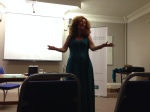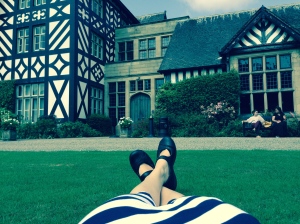Gregynog Philosophy Conference’14
PESGB Gregynog Conference 2014

How important is a constant intercourse with nature and the contemplation of natural phenomena to the preservation of moral and intellectual health! (Thoreau, Journal, 6 May 1851).
In the midst of the beautiful Welsh countryside awaits the Elizabethan Gregynog Hall, the University Of Wales conference centre. After five-hour train ride, window sightseeing, lots of chatter and a bit of dozing-off, our team arrived – the organisers, the regulars and the curious novices. Walking through the  screeching wooden halls of this 16th century beauty, it felt like walking in a live museum… the furniture, the musical instruments, the paintings and etchings by Monet, Cezanne and Van Gogh, and the hand-printed books from the Gregynog Press enveloped our sight. Like Alice in Wonderland, we followed the labyrinth up and down, discovering doors big and small. As a surprise, my room neighboured an “antique toilet,” which must’ve been last used by Henry VIII,and this part of the tour certainly felt like Lucy Worsley’s walk through ‘1000 years of toilet history’. The lavish green lawns were waiting outside, the sun was refracting its rays on the window, and we were ready to immerse ourselves in the coming days of lectures, discussions and exploration.
screeching wooden halls of this 16th century beauty, it felt like walking in a live museum… the furniture, the musical instruments, the paintings and etchings by Monet, Cezanne and Van Gogh, and the hand-printed books from the Gregynog Press enveloped our sight. Like Alice in Wonderland, we followed the labyrinth up and down, discovering doors big and small. As a surprise, my room neighboured an “antique toilet,” which must’ve been last used by Henry VIII,and this part of the tour certainly felt like Lucy Worsley’s walk through ‘1000 years of toilet history’. The lavish green lawns were waiting outside, the sun was refracting its rays on the window, and we were ready to immerse ourselves in the coming days of lectures, discussions and exploration.
*(Though are minds were preoccupied, we realise our privileged position to be in this beautiful place and time, while most of the world is in ongoing turmoil.)
As a novice gregynogarian, I was surprised by the breadth of themes covered by the presentations – from the remembrance of war, to conceptions of thinking, to aesthetics of educational discourse and philosophical inquiry. After a warm-up chatter over dinner, the conference kicked off with David Aldridge, Principal Lecturer in Education at Oxford Brookes University, and his paper on ‘How ought war to be remembered in schools?’. As 2014 marks the centenary of the WWI, David problematised the annual participation of state schools in the remembrance, as it is far from clear that ‘gratitude’ is an appropriate sentiment to foster with regard to those who have died in war. While he accepted that we might all have a duty to learn from historical events, he specifically challenged the idea that expressing certain sentiments or questions entails ‘dishonour’ to the memory of the dead. While his presentation dealt with historical events, it definitely raised questions about current events and ongoing wars.
 The morning started with the refreshing presentation by Christine Doddington, Senior Lecturer at University of Cambridge, who spoke beautifully about ‘The aesthetics of educational relationships: sculpting education differently’. Christine emphasized the power of everyday aesthetic awareness as a significant part of our life and educational experience. Her metaphor of ‘sculpting’ education was particularly powerful in a time when performance and accountability terminology has hardened our language and imagination. Christine challenged us to rethink how children should experience education. John Dewey would’ve agreed with her that, the living classroom should engage in an aesthetic experience where reason and emotion are not separate.
The morning started with the refreshing presentation by Christine Doddington, Senior Lecturer at University of Cambridge, who spoke beautifully about ‘The aesthetics of educational relationships: sculpting education differently’. Christine emphasized the power of everyday aesthetic awareness as a significant part of our life and educational experience. Her metaphor of ‘sculpting’ education was particularly powerful in a time when performance and accountability terminology has hardened our language and imagination. Christine challenged us to rethink how children should experience education. John Dewey would’ve agreed with her that, the living classroom should engage in an aesthetic experience where reason and emotion are not separate.
Emma Williams, Philosopher-in-Residence at Rugby School, followed with an engaging presentation while drawing from her paper on ‘Sound not Light: Levinas and the Elements of Thought’. As a recent PhD graduate, Emma has been interested in revealing what makes thought happen and what happens when we think. She opened new ways for understanding human thinking, by drawing on Levinas’ conception of thinking that is conditioned by sound (speech, language, and sign), and not solely by the medium of light (theoria, contemplation). Her insightful presentation further left us with a challenge to consider what this shift in thinking might mean to educational and everyday contexts.
The theme of thinking that is conditioned by sound interestingly intertwined with Adrian Skilbeck’s caution to the nature of the seriousness expressed in our natural language. In his presentation on ‘Raimond Gaita and the language of moral seriousness’, Adrian pointed to the inadequacy of critical vocabulary in academic moral philosophy in providing any kind of moral account of the extremes of suffering and depravity. He gave a vibrant account of Gaita’s theory of moral seriousness manifested in non-theoretical language and human practices, and cautioned against it becoming overworked and clichéd. He provided a lively illustration of this through the film ‘Fifty Years a Slave’.
 Angie Hobbs’ witty and vibrant character always lightens up the room, and so we were excited to have her as a member and a guest speaker. Her talk inspired many tweets and quotes like: “Give pre-Socratic dialogues to children before they go clubbing and they’ll have a fantastic psychedelic trip.” And indeed, she brought ancient Greek philosophy to life and unveiled it as one of the richest resources of paradoxes, puzzles, and aphorisms – a treasure trove for philosophical inquiry with pupils in both primary and secondary schools.
Angie Hobbs’ witty and vibrant character always lightens up the room, and so we were excited to have her as a member and a guest speaker. Her talk inspired many tweets and quotes like: “Give pre-Socratic dialogues to children before they go clubbing and they’ll have a fantastic psychedelic trip.” And indeed, she brought ancient Greek philosophy to life and unveiled it as one of the richest resources of paradoxes, puzzles, and aphorisms – a treasure trove for philosophical inquiry with pupils in both primary and secondary schools.
The final paper intertwined many of the themes that emerged throughout the conference, and especially resonated with the ideas of inquiry, ways of thinking and aesthetic experiences. Viktor Johansson, Assistant Professor at Stockholm University, was our special international speaker who passionately presented his work on ‘Beyond Words: Passion and Desire in Children’s Philosophizing’. Building on Angie’s philosophising with children, Viktor focused on the beauty of children’s expressions and scrutinized the notion of performative utterances as a passionate dimension of philosophizing. With his sweet four-month baby in the room, Viktor engaged our attention as a philosopher and as a dad, who had systemically explored the aspects of children’s philosophical expressions. He argued that in order to see the philosophical aspects of children’s questions and expressions, we need to look beyond mere words, but how their expressions are used in context and place.


The breadth of these intellectual discussions enlightened and sometimes puzzled us. There was enough food for taught and plenty lively discussions over tea and cake. And while there is a common misconception that philosophy conferences tend to be rather dull, you should’ve seen how our PESGB Show Choir accompanied by our talented pianist, sang the night away.
We are grateful to Naomi Hodgson and Paul Standish for organising another year of mind-body-world experience, here at beautiful Gregynog Hall. Next year, we look forward to engaging mind and nature as part of our philosophical contemplations, so join us from 28-30 July 2015 at the Gregynog conference.
